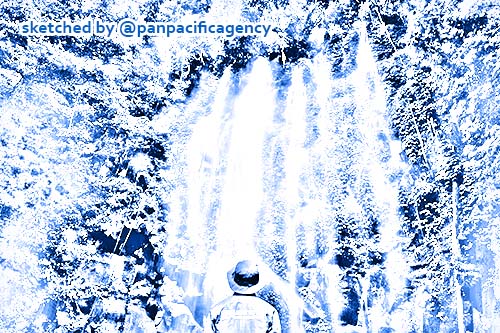[Analytics] China dresses down the US; and climate’s ‘hammer’ blow

In this picture taken on May 8, 2017 shows an Indonesian forest ranger admiring the sight of a waterfall in the Leuser ecosystem rainforest, located mostly within the province of Aceh on the northern tip of the island of Sumatra. (AFP Photo/Chaideer Mahyuddin). Sketched by the Pan Pacific Agency.
Amid an Olympic gold rush and a worsening pandemic, something else is happening that may ultimately do far more to shape the world: Already bitter relations between the United States and China are turning incredibly toxic. Stephen Collinson, Shelby Rose specially for the CNN.
US Deputy Secretary of State Wendy Sherman got quite the earful from Chinese Vice Foreign Minister Xie Feng when she arrived in the northern Chinese city of Tianjin. This followed tension that erupted in public in the first formal talks between China and the Biden administration in Alaska in March.
Xie, according to the Chinese Foreign Ministry, accused the US on Monday of wanting to reignite its own “sense of national purpose” by orchestrating a “whole-of-government and whole-of-society” campaign to demonize China.
“The US seems to be demanding cooperation when it wants something from China; decoupling, cutting off supplies, blockading or sanctioning China when it believes it has advantage; and resorting to conflict and confrontation at all costs,” said Xie, according to the statement.
Dressing down a visiting US dignitary is good domestic politics and fits with President Xi Jinping’s ultranationalist strategy. And the brutal tone is in keeping with a sharp slump in the world’s most critical diplomatic relationship early in the term of a new US President who has taken a tough line.
The recriminations come after the US and a broad coalition of allies recently accused China of cyber hacking, slammed the crackdown in Hong Kong and repression of Uyghur Muslim minorities, and criticized Chinese military pressure on Taiwan. Soon, a flotilla led by a new British aircraft carrier that includes US vessels will sail through the South China Sea, where Beijing makes vast and disputed territorial claims. Given the colonial overtones, the voyage is almost certain to flare tempers anew.
The US wants to put lines of communication in place, including a Cold War-style “red phone” warning system with Xi’s office for when confrontations threaten to spin out of control. It’s possible the Chinese fury could be diplomatic cover for an informal truce that could allow President Joe Biden to meet Xi at the G20 summit in Italy later this year. But the forces inflaming US-China relations are only becoming more alarming. And Washington-Beijing relations have rarely been worse.
‘It’s like a hammer hitting us on the head’
Those climate change deniers who respond to extreme weather events by saying, “Get over it. It’s summer, it’s hot,” are on, so to speak, increasingly thin ice.
Hotter and longer summers, prolonged and extreme droughts, and shorter winters with less snow are fueling raging wildfires in the US West, which experts say are the results of climate change in real time.
At least 86 active large wildfires have charred nearly 1.5 million acres, according to the National Interagency Fire Center. In all, 36,467 fires have burned a total of 2,770,454 acres across the United States, the center said.
The blazes are rampaging across farmland, destroying homes and increasingly testing exhausted firefighting crews. Land is ablaze in Montana, California and Oregon. One day last week, the skies in Washington, DC, were hazy with smog from Western wildfires a couple of thousand miles away, in a rebuke to politicians in the capital who have done little to tackle climate change.
The US is in for more extreme heat waves in the days ahead, likely to further fuel the infernos. And it’s not just in America that dangerous weather is making the news. There have been catastrophic floods in Europe and China in recent days — all attributed to environmental changes due to global warming.
Oregon Gov. Kate Brown, a Democrat, is battling to contain the Bootleg Fire, which has already burned more than 400,000 acres along her state’s border with California, and is the Beaver State’s third largest blaze since 1900.
“The harsh reality is that we’re going to see more of these wildfires. They’re hotter, they’re more fierce and obviously much more challenging to tackle. And they are a sign of the changing climate impacts,” Brown said Sunday on CNN.
“Climate change is here, it’s real, and it’s like a hammer hitting us in the head,” she said. “And we have to take action.”